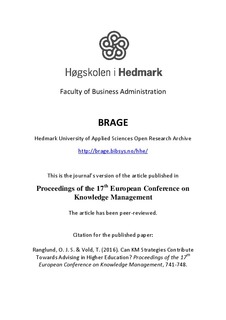| dc.contributor.author | Ranglund, Ole Jørgen Stefferud | |
| dc.contributor.author | Vold, Tone | |
| dc.date.accessioned | 2017-03-06T09:15:51Z | |
| dc.date.available | 2017-03-06T09:15:51Z | |
| dc.date.issued | 2016 | |
| dc.identifier.issn | 2048-8971 | |
| dc.identifier.issn | 2048-8971 | |
| dc.identifier.uri | http://hdl.handle.net/11250/2432983 | |
| dc.description.abstract | Traditional advising is challenged in the age of the online medium. Many of the subtleties of an advising session, like eye contact, facial expressions and facial mimic, are lost in the transition to written feedback. It is possible to use media that to a certain extent includes this, like videoconferencing. Online education has become a demand in the market, but is also a cost effective way of distributing courses. Lecturers are aware of how important feedback is to students learning outcome, and that it takes time and efforts to provide feedback that will bring the students forward. At the same time, there is a demand from university management regarding cost efficiency and thus reduce the time spent on this activity. Trust is also something that is established in the physical meeting. It is sometimes essential both for the advisor and the student to establish a trust between the parties. Trust may influence the outcome of the advising session; lack of trust can contribute to mistrust from both parties. The consequences may be that the students’ experience a patronizing advisor, and/or the advisor do not get their advices across. Within the area of Knowledge Management, a way of sharing knowledge is forming Communities of Practice (CoP) and when the organization either works distributed they can form Virtual CoP’s . Some research is undertaken to find optimal ways of making the members of the organizations work together in a best possible way, utilizing the online medium. This paper presents a theoretical approach towards two issues; solving the issues of online advising using experiences and guidelines from KM strategies, e.g. Virtual CoP’s, and is it possible at the same time to prepare the students for a work life in distributed organizations in a better way? | |
| dc.language.iso | eng | nb_NO |
| dc.publisher | Academic Conferences and Publishing International | nb_NO |
| dc.rights | Attribution-NonCommercial-NoDerivatives 4.0 Internasjonal | * |
| dc.rights.uri | http://creativecommons.org/licenses/by-nc-nd/4.0/deed.no | * |
| dc.subject | advising | nb_NO |
| dc.subject | tacit knowledge | nb_NO |
| dc.subject | VCoP | nb_NO |
| dc.subject | online advising | nb_NO |
| dc.subject | adult learning | nb_NO |
| dc.subject | transactional distance theory | nb_NO |
| dc.subject | explicit knowledge | nb_NO |
| dc.title | Can KM Strategies Contribute Towards Advising in Higher Education? | nb_NO |
| dc.type | Journal article | nb_NO |
| dc.type | Peer reviewed | nb_NO |
| dc.subject.nsi | VDP::Samfunnsvitenskap: 200 | nb_NO |
| dc.source.pagenumber | 741-748 | nb_NO |
| dc.source.journal | Proceedings of the 17th European Conference on Knowledge Management | nb_NO |

